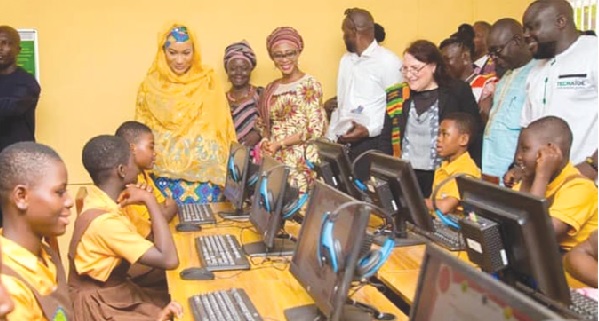
Participation in global digital world: Equipping learners with skills essential
Sometime in 1993, I took an exeat from Prempeh College to travel home on what was probably one of the many made up excuses that all first-year boarding students are known to make in order to escape the tyranny of seniors.
When my STC arrived in Accra, I went straight to my father’s office to wait until it was time to go home. When I entered his office, I saw what I initially believed to be a television sitting at the corner of his desk.
When we got home that evening, I told my siblings that “Dad was so fortunate that he can watch TV all day in the office” – It was only later that I discovered that it was a computer.
Today, some 31 years later, the ‘televisions’ fit into our hands as smart digital devices that allow us to have the world at our finger tips for communication, research and participation in commerce and the digital economy.
From the comfort and safety of our private spaces, we are connected to the world. Technology has aided in our advancement, opened up new mediums for connecting, learning and sharing information. Learning platforms and search engines have helped to consolidate and curate information.
Where we are
In Ghana, our path to digitisation and digital literacy in our schools has been mixed as we continue to make efforts to ensure we are not left behind in the wave of digital revolution happening.
Chronicling the last decade, we have witnessed the introduction of ICT labs and iBoxes as part of the Secondary Education Improvement Project (SEIP) to more than 240 beneficiary schools and efforts by the Center for Distance Learning and Open Schooling (CENDLOS) to expand the iBox to more schools.
During the COVID-19 pandemic, efforts were made to ensure that our education system was more resilient to shocks.
During that period in 2020, some 3,000 preloaded tablets were distributed to special needs learners in GES schools to aid in their learning during the COVID-19 and post-COVID-19 period.
The Ghana Library Authority (GhLA) has completely digitised their systems ensuring that all educational content is available on the Ghana Library App along with other Open Educational Resources.
Government has also partnered with teacher unions to procure and supply laptops to teachers to aid in teaching and learning.
There has also been the initial implementation of the National Digital Literacy Project that has seen some 700 basic schools equipped with smart classrooms that include tablets for students, laptops for teachers and a content access point to aid teaching and learning.
Tertiary institutions across the country have been using learning platforms to deliver both synchronised and a-synchronised instructions.
More recently, in March 2024, the government launched the One Student One Tablet project, an effort to ensure that some 1.3 million second cycle students are provided with digital devices for learning.
On the back of all of this digitisation in education, telecommunication giants, MTN and Telecel (formally Vodafone) continue to partner the GES and the GhLA to providing zero rating to educational content.
All indication is that Ghana wishes to fully participate in the global and digital world with efforts at making our schools integrated with new technologies.
However, this forward march towards digitally inclusive and accessible schools also means we must prepare our learners to be digitally literate and be good digital citizens.
What we must consider
Digital access and online presence are the wave of the future, however, this means that our students and teachers must possess the competencies and skills to participate effectively and responsibly.
There are a number of key things to consider for our learners and teachers in education.
First, there is the need to ensure that we equip our leaners and teachers to exhibit positive Digital Citizenship in their online participation.
They must understand their digital rights and responsibilities, knowing that the same values and principles that govern their behaviour in our society must govern their online behaviour.
The tendency to think that an online presence gives one a certain faceless anonymity should be discouraged because a person’s digital footprint is permanent.
Second, Online Safety is critical – this means our learners and teachers should be equipped to identify and protect themselves and others against cyberbullying, build online social cohesion and take cybersecurity seriously.
They must have the savviness to navigate the digital world with the same level of interpersonal communication skills as they use for the physical environments they operate in.
Third, they must learn to value and appreciate the importance of being Digitally Literate so as to help them properly find, analyze, use, share and create consumable content using technologies and their online presence.
Digital literacy also means being able to have the ability decipher information especially from social media and new media sources, verifying the authenticity of information before sharing it, thereby curtailing the spread of false and misleading information.
Finally, just as we have Intelligence Quotient (IQ) and Emotional Quotient (EQ), it is imperative that our learners and teachers exhibit a high level of Digital Quotient (DQ) in the fast pace digital world that we find ourselves.
Digital Intelligence is crucial for our development and learning. I am a firm believer that the time has come where leap frogging is no longer enough for our advancement, we must quantum leap in our learning and innovation in order to ensure that we are future ready.
The writer is the Deputy Director-General for Quality and Access of the Ghana Education Service.
Contact email:
